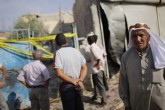The Syrian crisis and conflict has been going on for about 19 months and the bloodshed began to spill across Syrian border. This directly influenced the neighboring Jordan and Lebanon—which had a lax border security even before the crisis—and Turkey. In fact stray bullets from the conflict between the Free Syrian Army (FSA) and Syrian regime along the Syrian-Turkish border have occasionally landed in Turkey. The crashes after the FSA seized the control of border crossings particularly affected Turkey. However it was only after Syria downed a Turkish F-4 jet in international airspace without any warning that Syrian violations against Turkey began to dominate the headlines. When Syrian violations began to pose a danger to Turkey, Turkey adopted a threat-based approach towards Syria. Turkey was on the alert, so to speak, in order to stop Syrian violations or retaliate against these violations.
One had better analyze the tragic event in Akcakale and Turkey’s reaction to it in the light of above-mentioned background. The ongoing conflicts since the FSA seized the control of Tel Abyad border crossing caused stray bullets, shrapnel pieces and shells to land in Akcakale. Therefore schools were closed, military vigilance was declared and Turkey sent a diplomatic note to Syria. That Syrian regime insisted on Tel Abyad border crossing contrary to other border crossings led, unfortunately, to the attack which took place on Wednesday.
Why Tel Abyad?
Tel Abyad is neither the first nor the last border crossing of which Syrian regime lost control. The opposition seized the control of borders particularly with Turkey, Iraq and Jordan. Conflicts after the FSA seized the control of Bab al-Hava crossing border had media coverage in Turkey; nevertheless these conflicts did not last long and the Syrian army withdrew contrary to what happened in Tel Abyad. What makes Tel Abyad special and what causes the regime to resist in Tel Abyad is largely related to its strategic position. Along Idlib-Aleppo-Rakka-Hassake borderline, in other words along Turkish border the only place that the regime still has control of is Rakka city center and it is the only place left in order that regime won’t lose the overall control of northern front. That the regime lost Aleppo struggling and Hassake without a fight renders Rakka and Tel Abyad—where the regime is thought to receive external support for Rakka—much more significant. The regime tries to block logistical support to the FSA—who is preparing for an attack on the Rakka city center—and to create a buffer zone between Aleppo and Deir ez-Zor by seizing the control of Tel Abyad. Therefore the regime has not put an end to the crashes close to the border contrary to warnings from Turkey.
It is easy to answer to this question by looking at where the FSA is deployed. Let’s leave aside that the FSA doesn’t have such a shell which landed in Akcakale in its inventory and that tracking systems in Turkey track the mobility there. In a conflict where the FSA is between the regime and Turkey it is easy to guess who fired the shell that landed in Turkey by just looking at this whole picture.
Turkey’s right to Retaliate
Posing this question is pointless as far as Turkey’s right to retaliate is concerned but this question is significant in order to understand the intention of Syrian regime. In this sense, it is worth first mentioning that Akcakale and Tel Abyad and even most of the villages in both sides of the border are intertwined. That the aerial distance between some parts of the two cities is as low as 700 meters increases the possibility of a conflict in one side of the border to spill across the other side. One shouldn’t ignore that this event can be unintentional; however, even if this is true, what regime did resembles that a car travelling at 250 km per hour on a macadam road involves in an accident. As mentioned before, whether this event was intentional or unintentional is not signifi

